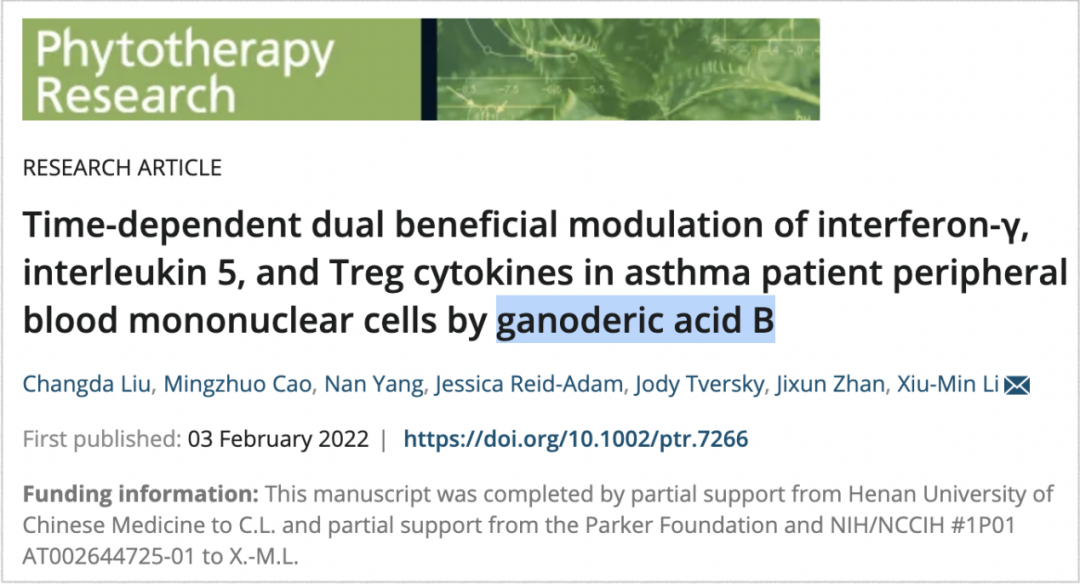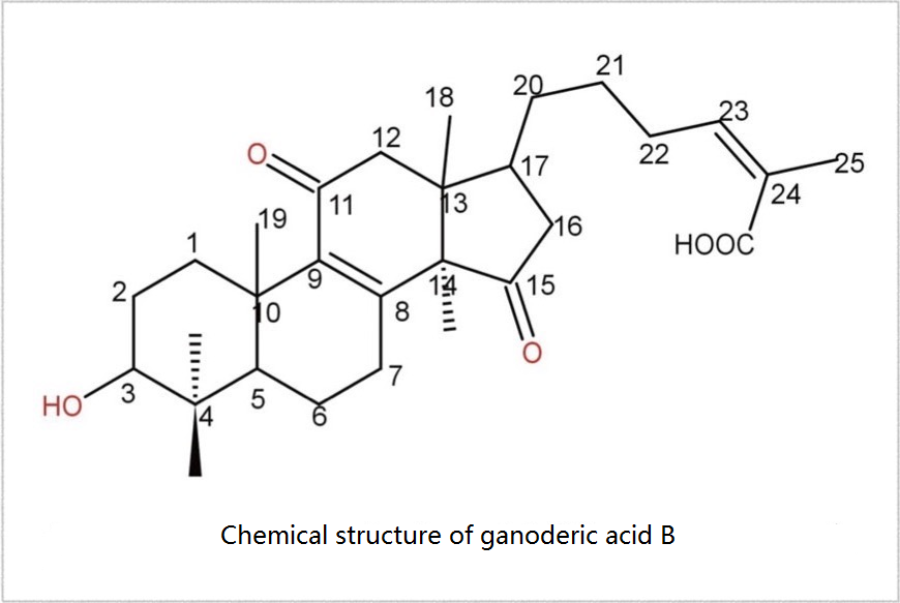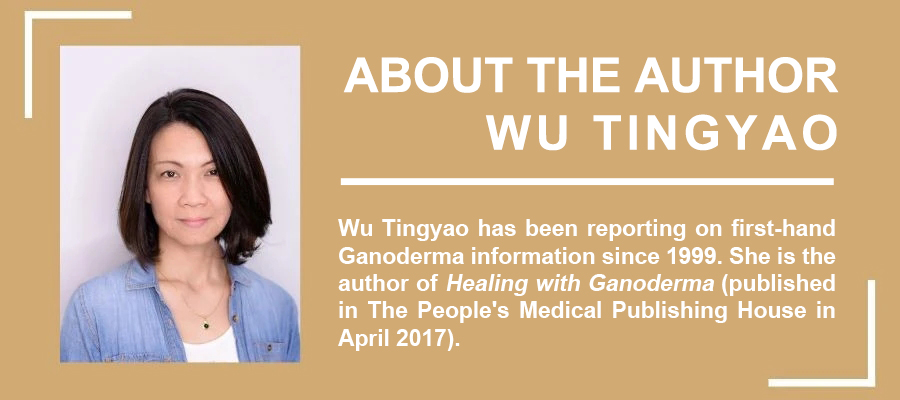
사람들에게 알레르기가있는 이유는 무엇입니까??
알레르겐이 발생할 때 인체가 알레르기 반응을 가질 지 여부 (유형 1 또는 유형 2 도우미 T 세포).
T 세포가 Th1에 의해 지배되는 경우 (Th1의 많은 수와 높은 활동으로 표현), 신체는 알레르겐의 영향을받지 않습니다, Th1의 과제는 안티 바이러스이기 때문입니다, 항 박테리아 및 항 종양; T 세포가 Th2에 의해 지배되는 경우, 시체는 알레르겐을 유해한 반체제로 간주하고 전쟁을 시작합니다., 소위“알레르기 헌법”. 알레르기가있는 사람들, TH2에 의해 지배되는 면역 반응 외에도, 일반적으로 Treg의 문제가 수반됩니다 (조절 T 세포) 너무 약합니다. Treg는 T 세포의 또 다른 부분 집합입니다, 염증 반응을 종식시키기위한 면역계의 브레이크 메커니즘입니다.. 정상적으로 기능 할 수없는 경우, 알레르기 반응은 더 강하고 오래 지속될 것입니다.
항 알레르기 가능성
다행스럽게도, 이 3 개의 T 세포 서브 세트의 강도 사이의 관계는 정적이지 않지만 외부 자극 또는 생리 학적 변화로 조정됩니다.. 그러므로, Th2를 억제하거나 Th1을 증가시킬 수있는 활성 성분은 종종 알레르기 구성을 조정하고 알레르기 반응을 완화 할 가능성이있는 것으로 간주됩니다..
에 발표된 보고서 식물 요법 연구 Li Xumin 교수, 약학대학, 중국 전통 의학 대학, 그리고 여러 미국 학업 기관의 연구원들, 뉴욕 의과 대학 및 Johns Hopkins University 천식 및 알레르기 센터 포함, 3 월 2022 단일 구성 요소 중 하나를 지적했습니다 영지버섯 트리테르페노이드, 가노데르산 B, 위에서 언급 한 항 알레르기 잠재력이 있습니다.

가노 레네체 산의 항 혈증 효과 b
연구자들은 혈액에서 T 세포를 포함하여 면역 세포를 추출했습니다. 10 알레르기 성 천식 환자, 그런 다음 환자 자신의 알레르겐으로 자극했습니다 (먼지 진드기, 고양이 머리, 바퀴벌레 또는 hogweed), 그리고 가노 레네체 산이 있다면 b (복용량으로 40 μg/mL) 면역 세포가 알레르겐에 노출 된 6 일 동안 함께 행동했습니다.:
TH1과 Treg의 수는 증가합니다, 그리고 Th2의 수는 감소 할 것입니다;
cytokine 사이토 카인 IL-5 (인터루킨 5) 염증을 유발하기 위해 Th2에 의해 분비된다 (알레르기) 반응은 감소합니다 60% 에게 70%;
cytokine IL-10 (인터루킨 10), 염증 반응을 조절하기 위해 Treg에 의해 분비됩니다., 단일 자리 수준 또는 수십 자리 수준에서 500-700 Pg/ml;
④ 인터페론 감마의 분비 (IFN-γ), Th1 차별화에 도움이되지만 Th2의 발달에 유리합니다., 더 빠릅니다, 따라서 면역 반응의 방향을 일찍 역전시킨다.
ganoderic acid b에 의해 증가 된 인터페론-감마 공급원에 대한 푸른 분석은 인터페론-감마가 Th1에서 오지 않는다는 것을 발견했다. (가노 데릭 산 B가 관여하는지 여부에 관계없이, Th1에 의해 분비 된 인터페론 감마는 거의 없습니다) 그러나 살인자 T 세포와 자연 살인자 세포에서 (NK세포). 이것은 가노 디저 산 B가 알레르기 반응과 관련이없는 다른 면역 세포를 동원 할 수 있음을 보여줍니다..
게다가, 연구팀은 또한 가노 데저 산 B를 스테로이드로 대체했습니다. (10 μM 덱사메타손) 알레르겐에 직면 한 천식 환자의 면역 세포에 미치는 영향을 관찰합니다.. 결과적으로, Th1의 수, Th2 또는 Treg 및 IL-5의 농도, IL-10 또는 인터페론 -γ가 실험의 시작부터 끝까지 감소되었습니다..
다시 말해서, 스테로이드의 항 알레르기 효과는 면역 반응의 전반적인 억제에서 비롯된 반면, 가노제 산 B의 항 알레르기 효과는 단순히 항 알레르기가 있으며 항 감염 및 항 종양 면역에 영향을 미치지 않습니다..
그러므로, 가노 디저 산 B는 또 다른 스테로이드가 아닙니다. 정상적인 면역을 파괴하지 않고 알레르기 반응을 조절할 수 있습니다, 그것은 귀중한 기능입니다.
충수: 가노 레네체 산의 생리 학적 활성 b
가노 디저 산 B는 그 중 하나입니다 영지버섯 트리테르페노이드 (다른 하나는 가노 레네체 산 a입니다) 발견 된 1982, 그 정체성이 단지“쓴 맛의 원천 영지버섯 결실 신체”. 나중에, 여러 나라의 과학자들의 릴레이 탐사하에, 가노 데릭 산 B는 또한 많은 생리 학적 활동을 가지고 있음이 밝혀졌습니다., 포함:
➤ 혈압 감소/안지오텐신-컨벤션 효소 억제 (1986, 2015)
➤ 콜레스테롤 합성의 연속 (1989)
➤ 암세기 (1997)
➤ HIV-1 프로테아제의 안티 AIDS/억제 (1998)
➤ 전립선 비대/전립선의 수용체에 대한 안드로겐과 경쟁 (2010)
➤ α- 글루코시다 제 활성의 산티-당뇨병/억제 (2013)
➤ 안티-리버 암/살해 다 약제 내성 인간 간암 세포 (2015)
➤ 안티 에프슈타인-바 바이러스 / 비 인두 암종 관련 인간 헤르페스 바이러스 활성의 억제 (2017)
➤ 안티-파광 / 산화 방지제 및 항 염증 효과를 통한 급성 폐 손상 완화 (2020)
➤ 항-알레르기/알레르겐에 대한 T 세포의 면역 반응을 조절합니다 (2022)
[원천] 창다 리우, et al. 인터페론 -γ의 시간 의존적 이중 유익한 변조, 인터루킨 5, 및 천식 환자 말초 혈액 단핵 세포에서 트레그 사이토 카인 B. phytother res. 2022 3 월; 36(3): 1231-1240.
끝

★ 이 글은 저자의 단독 승인 하에 게재되었습니다., 그 소유권은 GanoHerb에 속합니다..
★ 위 작품은 복제할 수 없습니다, GanoHerb의 승인 없이 발췌되거나 다른 방법으로 사용되는 경우.
★ 저작물이 사용 승인을 받은 경우, 승인 범위 내에서 사용해야 하며 출처를 명시해야 합니다.: 가노허브.
★ 위 사항을 위반한 경우, GanoHerb는 관련 법적 책임을 추구합니다.
★ 이 기사의 원문은 Wu Tingyao가 중국어로 작성하고 Alfred Liu가 영어로 번역했습니다.. 번역 내용에 차이가 있는 경우 (영어) 그리고 원본 (중국인), 원래 중국어가 우선합니다. 독자들이 궁금한 점이 있으면, 원작자에게 연락주세요, 양. 우팅야오.



